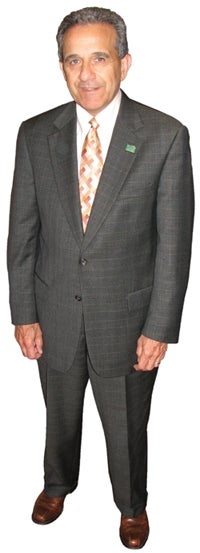Robert V. Antonucci knows Fitchburg State College very well. After all, he earned bachelor’s and master’s degrees from the school and returned to serve as president in June 2003. His career has ranged from experience as state commissioner of education to heading up education efforts in private industry. Now starting his seventh year at FSC, he discusses what drew him back to Fitchburg and the challenges that are unique to working within the state college system.
>> Why did you come back to Fitchburg State College after working in the private sector?
I was nominated by someone and I got a call from a recruiter who asked me whether I’d be interested in coming back. At first I didn’t express an interest and then she called back again, and I said, “Well, why not?” It was a chance to come back to my alma mater. I knew the area quite well, I knew higher education and I had the academic background necessary for it. At that point in my career I felt I could give back a little.
>> Your background includes working in the business sector, specifically helping to launch one of the earliest online colleges in Massachusetts. How does that private industry experience inform your work today?
I think that experience has been invaluable to me. I know the education piece of it, but having the business side of it is so, so important today, especially because of the tight budgetary environment the state is in. One of the things in business, for publicly traded companies, is that every quarter you have to take stock of where you are. That same approach is what I try to do in Fitchburg. What are the things we’re doing well, what are things we should fix and what are the cutting edge initiatives we need to get involved in to grow? All the while, you still have to respect the academic integrity of an institution of higher ed. As I say, on this campus, there are three things that we do: teaching, learning and service. Everything we do revolves around those three things. But if you don’t have a solid business foundation, you can’t do the things you want to do.
>> Fitchburg State is in the middle of a $12.5 million capital campaign. What’s the money for? Is it mostly buildings?
Buildings are part of it. But scholarships are a major part of it, so we can provide more financial aid to our students. We’ve also received, as part of the campaign, $1 million for an endowed chair in history of western civilization. That million is invested and the revenue goes to our faculty member. There’s naming rights of buildings. There’s creation of business research institutes. There are a whole host of opportunities. We developed a plan that clearly articulated what the needs of the college will be over the next 10 years. Potential donors can look at that plan and decide whether they want to contribute or come up with a new initiative.
>> Seems like a capital campaign is an unusual step for a public college…
It is, but more and more are doing it because we have to. I’d say in the last 10 years you’ve seen a major change in public institutions. We’re becoming more private than we are public. We receive today only about 30 percent of our revenue from the state. The rest is raised through tuition, fees and fundraising. Ten to 15 years ago it was 55, 60 percent that we got form the state. That state appropriation still helps us, but we have to run almost like a private institution. But we’ll never forget that our mission is to provide access and affordability for a number of students who otherwise don’t have an opportunity to go to college. I don’t ever want to lose sight of that.
>> What’s been the biggest challenge for you to learn as a manager?
Higher ed is very complex. Every industry has its own culture. So the hardest thing when I came back to the campus was: How do you meet the needs of all the constituencies, and that means faculty, staff, students, alumni, trustees, and create a cohesive effort to move the college forward? Colleges are very democratic and I like that. Everybody on this campus has a say in how it’s run but at some point you have to make decisions to move forward. You will never get 100 percent agreement but at some point you have to say enough is enough. While I really like the dialogue that occurs on a college campus, the most difficult challenge is bringing the dialogue to a close. I’ve learned this from business: You can’t stay still for too long.
Watch as Robert V. Antonucci shares thing he likes most about his job as president of Fitchburg State College.

